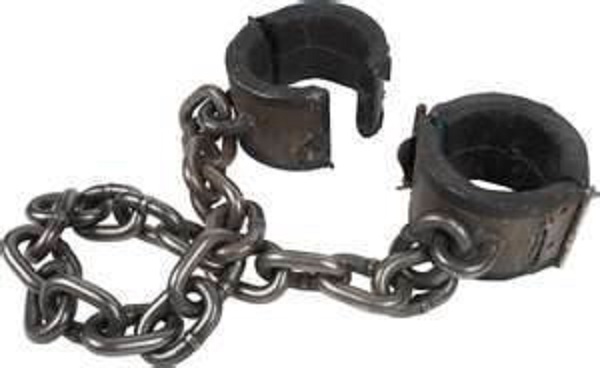
Stephen
Terry, Director

The
Third Missionary Journey
Commentary
for the September 8, 2018 Sabbath School Lesson
 After
we had been there a number of days, a prophet named Agabus came down from
Judea. Coming over to us, he took Paulís belt, tied his own hands and feet with
it and said, ďThe Holy Spirit says, ĎIn this way the Jewish leaders in
Jerusalem will bind the owner of this belt and will hand him over to the
Gentiles.íĒ Acts 21:10-11, NIV
After
we had been there a number of days, a prophet named Agabus came down from
Judea. Coming over to us, he took Paulís belt, tied his own hands and feet with
it and said, ďThe Holy Spirit says, ĎIn this way the Jewish leaders in
Jerusalem will bind the owner of this belt and will hand him over to the
Gentiles.íĒ Acts 21:10-11, NIV
When we read about the treatment of the early Christians,
their beatings, imprisonment and even martyrdom, we are often lulled into a spirit
of thankfulness that these things happened long ago and that we live in more
enlightened times. But, however insulated we may be in Western Society, these
things still blatantly happen in many places around the world and particularly
in the very part of the world that Paulís missionary journeys encompassed.
There are many shocking videos to be found on social media detailing the
horrific abuse that Christians are subjected to daily. There is little wonder
that many of them would like to seek the comparative safety of asylum in countries
where such persecutions do not occur. As fellow Christians, we should welcome those
refugees with open arms, remembering how bloody the genesis was of our common
faith, both in terms of the Saviorís experience and the experiences of the
early believers until a degree of safety was found in the 4th
century as the Roman Empire became more accommodating.
Nonetheless, we should not forget two things that should
always be present in our thoughts concerning these persecutions. First, we
should always be aware of how thin the veneer of civility is that insulates us
from the harm done to Christians elsewhere. I experienced this while in the
Army shortly after the end of the Vietnam War. Christians were welcomed into
the ranks during the war in order to fulfill the demands for armed bodies to
toss into that meat grinder. Even non-combatants, like me, were welcomed because
no one wanted to be the one to crawl out and help the wounded under withering
fire from the enemy. ďIf someone was willing to do it in lieu of carrying a
rifle into combat, let them do it,Ē was the attitude. But once the war ended,
the military adopted a hostile stance to Christians and especially to non-combatants,
even medics. The accommodations for my faith that I had experienced during the
war suddenly evaporated when the doves of peace took flight. The end of the conflict
meant the military needed to downsize, and as part of that process, they made
it clear that they only wanted to retain those who were willing to carry
weapons and use them against the enemy, soldiers who placed their allegiance to
the military above any allegiance to God. First to go in my battalion was a
Pentecostal Christian. Then they convinced a Jehovahís Witness member to renounce
his faith in order to remain active. Finally, they came after me.
The battalion commander, a lieutenant colonel, had
formed a goon squad of burly sergeants he turned loose on the Christians under
his command. The Pentecostal had mysteriously fallen down the stairs in the
barracks. The Jehovahís Witness was intimidated only by their threats of harm. Perhaps
stubbornly, I preferred to trust in Godís deliverance and chose not to
compromise my faith. The commander arranged to have me on an errand to the
supply section where these sergeants were working so they could later identify
me. After that came three attempts on my life, all intended to appear
accidental. The first attempt failed to accomplish much more than a severe
concussion. The second and third were both miraculously prevented by divine
intervention. When I did not yield, in spite of these attempts, I was reduced
in rank and threatened with being taken to the federal prison at Leavenworth,
Kansas in chains should I continue to place my faith in God over faith in the
colonel. At that point, God intervened through the actions of the commanding general
in Anchorage, Alaska who thwarted my colonel in Fairbanks and expedited my
separation from the Army with an honorable discharge despite my colonelís opposition.
Up until the efforts of that colonel, I had an unblemished record even throughout
the Vietnam War. Coincidentally, my discharge from the military came at the
right time to enroll as a freshman theology student at Walla Walla College. My
school experience was also fraught with miracles but goes beyond the scope of
this commentary. The point to be understood here is that we are never very far
from persecution and perhaps even death at the hands of those who position
themselves as enemies of Christ and His followers.
Paul had a perspective on this that may be somewhat
foreign to modern believers. When we read the twenty-third Psalm today, we are inclined
to think that the ďvalley of deathĒ experience is something for someone else,
and if we are friendly, loving Christians, we may be able to avoid it
altogether. But Paul saw himself as walking constantly in that valley, never
far from imprisonment and even death. Even when faced with the prophecy of
Agabus as to what he would face if he continued toward Jerusalem, he resolved
to continue on, not wavering from his purpose. Experience had taught him that
even though that valley of death was his constant environment, God was right
there with him, just as the Psalmist had written. Because of my own experience,
I understand what that was like for Paul. When these things happen, we do not
know the outcome. Looking back now, I can see Godís intervention, but at the
time, I had no knowledge of what steps God might take. I certainly had no
personal relationship with the general in Anchorage, and I doubt he had prior
knowledge of me. Similarly, Paul had the prophecy of Agabus, but he did not
know that he would eventually be exonerated and released after a lengthy
captivity and a perilous trip to Rome. And he could not presume on that
experience for the future. In fact, when he underwent a second trial in Rome,
he was sentenced to death.
Would it have made a difference if he knew the outcome?
His response to Agabus seems to indicate it would not. Paulís experience calls
each of us to question our own faith commitment. We often hear those who praise
God for making it possible for them to take a special trip, attend the school
they were seeking to matriculate to, or to secure a coveted job with a
preferred employer. While God may indeed speak into their lives at such
moments, the reality of faith is most often experienced when that trip, that
school enrollment or that prestigious job goes all awry. Do we then assume we
were mistaken about what we proclaimed previously was Godís intent, or do we
look for His presence in that challenging valley?
When we read of Paulís experience and the many warnings
he had about His trip to Jerusalem, we are tempted to think that he obstinately
preferred his own will over Godís. This may be because we do not feel
comfortable believing that a loving God would ever lead anyone into such a
horrible experience. We may choose to believe that God only wants to give each
of us beauty for our ashes.[i] That may at times be the
case, but for that exchange to take place, one first must have the ashes to
exchange. We may feel that they can only come from wrong choices. After all,
why would a loving God give us ashes in the first place? While we may not know
the reasons entirely, a closer reading of the 23rd Psalm[ii] may reveal the answer.
God leads us in the paths of righteousness. If we end up in the valley of the
shadow, it is possible that God may have led us there on that righteous path. Some
have rejected any possibility of this in spite of the evidence of the book of
Job, or the evidence of the Holy Spirit leading Jesus into the desolate
wilderness to suffer and be tempted.[iii]
This possibility is the second of the two things I have
previously suggested Christians should not forget. Peter proclaims that these
things should not be a surprise to us, but rather an honorable means to glorify
God through our experience.[iv] Whether we look to the book
of Daniel, Jesusí words in Matthew, chapters 24 and 25, or to the Book of
Revelation, we must admit that our faith repeatedly presents an apocalyptic
perspective of the future. Reaching that apocalypse necessitates ever
increasing hardships for Christís followers, even to the point that those who
are persecuting them will feel that they are doing the will of God in
mutilating and slaying Christians.[v] For those who find that
hard to believe, do we not already see that in many countries where the Islamic
faith predominates? Even in the West, there are many who have come to believe
that religion is the cause of evil and that all who practice any religion
should be extirpated. This, or course, would include Christians. They may feel
that doing so would usher in an age of enlightenment and toleration. The same
was claimed about the French Revolution. Many headless corpses later, history revealed
that it was anything but.
What I discovered while living within the arctic tundra
of Alaska and Paul discovered in Anatolia and Macedonia is that God is often at
His most glorious and demonstrates His care for us most profoundly when that
care is necessitated by persecution for our unwavering commitment to our relationship
with Him. The scientific method is based on postulating a theory and then testing
that theory to see if it works. It your theory is that God does not want you to
suffer and will insulate you from any hardship, I invite you to consider the
possibility that suffering, too, is a part of Godís plan, and perhaps that
suffering may reveal Godís power and love on your behalf that could never be
revealed any other way.
